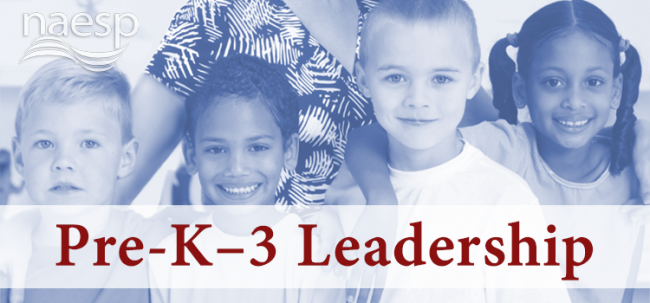 Pre-K–3 Leadership
Pre-K–3 Leadership
A growing body of evidence shows the benefits of early childhood education experiences, both for the child and society. However, many studies also show that achievement gaps appear early and widen over the years that children are in school.
Now more than ever, educators must understand the need to support a seamless continuum of learning for every child across prekindergarten through the third grade, typically age three to age 8. NAESP’s Leading Learning Communities: A Principals Guide to Early Learning and the Early Grades (Pre-K–3rd Grade) encourages elementary principals to deepen their own knowledge and skills related to Pre-K–3rd grade, and to provide specific guidance for principals to become more effective leaders on behalf of young children.
Pre-K–3 Publication
 Leading Learning Communities: A Principals Guide to Early Learning and the Early Grades (Pre-K–3rd Grade) encourages elementary principals to deepen their own knowledge and skills related to Pre-K–3rd grade, and to provide specific guidance for principals to become more effective leaders on behalf of young children. NAESP first published Leading Early Childhood Learning Communities in 2005. In the 15 years since then, a national Pre-K–3rd grade movement has emerged and continues to grow. This updated guide, written in 2020, extends NAESP’s long-standing commitment to supporting early learning and the early grades, and puts new stakes in the ground as both research and practice have become more sophisticated in their recognition of the importance of the Pre-K–3rd grade span.
Leading Learning Communities: A Principals Guide to Early Learning and the Early Grades (Pre-K–3rd Grade) encourages elementary principals to deepen their own knowledge and skills related to Pre-K–3rd grade, and to provide specific guidance for principals to become more effective leaders on behalf of young children. NAESP first published Leading Early Childhood Learning Communities in 2005. In the 15 years since then, a national Pre-K–3rd grade movement has emerged and continues to grow. This updated guide, written in 2020, extends NAESP’s long-standing commitment to supporting early learning and the early grades, and puts new stakes in the ground as both research and practice have become more sophisticated in their recognition of the importance of the Pre-K–3rd grade span.
The guide supports practicing elementary school principals who have direct connections to, and opportunity to influence, the learning opportunities provided to children, Pre-K–3rd grade and is organized around six competencies:
- Competency 1: Understand Child Development and Its Implications for High-Quality Instruction and Interactions, Pre-K–3rd Grade
- Competency 2: Develop and Foster Partnerships with Families and Communities
- Competency 3: Embrace and Enact an Instructionally Focused Pre-K–3rd Grade Vision
- Competency 4: Ensure Equitable Opportunities
- Competency 5: Share Leadership and Build Professional Capacity
- Competency 6: Promote a Culture of Continuous Improvement
Effective leadership of Pre-K–3rd grade requires substantive expertise about child development and instructional practices that support young learners. This guide highlights explicit ways in which being an effective Pre-K–3rd grade principal goes beyond traditional roles for elementary principals.
Coming Soon on Amazon!
Pre-K-3 Leadership Academy®
 NAESP is proud to have received an ASAE Power of A Silver Award for the Pre-K–3 Leadership Academy®. Learn more
NAESP is proud to have received an ASAE Power of A Silver Award for the Pre-K–3 Leadership Academy®. Learn more
In 2015, following the publication of Leading Pre-K–3 Learning Communities, NAESP developed the Pre-K–3 Leadership Academy®, the first nationwide blended professional learning program to provide principals and other leaders with a job-embedded, sustained, and on-going professional learning experience focused on mastering effective instructional leadership practices that are developmentally-appropriate. The year-long learning experience results in a credential as an NAESP Pre-K-3 Leader.
An advisor will guide candidates through a collection of personalized support and resources grounded in current research and effective practice, or two levels of coursework designed to lead to mastery of a competency that will help solve a problem of practice. The credential program is easily adopted by states and districts in order to offer a microcredential in Pre-K-3 leadership. The academy is structured as a blended learning environment that will:
- Build the capacity of Pre-K–3 leaders by increasing their knowledge and skills through the effective use of technology-based tools;
- Engage adult learners through technology-mediated professional learning and online communities of practice; and
- Facilitate a capstone experience that is individualized, relevant to the participants’ professional growth, and promotes the success of their current school community.
The Leadership Experience Speaks for Itself
View the impressive results from the NAESP Pre-K–3 Leadership Academy® pilot launch:
Academy Results
To address the gap between early childhood programs and early elementary schooling, NAESP developed and piloted the NAESP Pre-K–3 Leadership Academy®. The blended learning academy trains school leaders in the necessary competencies to oversee education in early childhood settings.
The inaugural cohort took place in Alabama in the 2017-2018 school year and included 29 school leaders. Jon Schmidt-Davis of the Southern Regional Education Board (SREB) conducted the evaluation in August 2018 and prepared the report, “Evaluation of the 2017-18 Implementation of the NAESP Pre-K–3 Leadership Academy Pilot in Alabama,” for NAESP. Here are major outcomes from the pilot academy.
- Addressing the needs of vulnerable children: Ninety percent of respondents reported that the academy helped them to “better meet the needs of vulnerable children.” Participants reported statistical significant growth in each of the six Pre-K–3 leadership competencies. Those competencies are:
- Competency 1: Embrace the Pre-K-3 early learning continuum
- Competency 2: Ensure developmentally appropriate teaching
- Competency 3: Provide personalized learning environments
- Competency 4: Use multiple measures of assessment to guide student learning growth
- Competency 5: Build professional capacity across the learning community
- Competency 6: Make schools a hub of Pre-K–3 learning for families and communities
- Increasing professional learning: There was a 42 percent increase in joint professional development (PD) including both ages 0-4 and grades K–3 practitioners. Across all participants, there were 92 joint PD events in 2017-18, up from 65 in 2016-17. Fourteen of 21 participants (67 percent) reported an increase. Respondents also reported that 139 of the K–3 teachers at their schools are currently receiving early childhood training, credentials, accreditation, or experience.
- Making schools a hub for Pre-K–3 learning: At the beginning of the program, participants identified Competency 6 as their weakest, giving an average rating of 3.76 on a six-point Likert scale. At the end of the academy, the average rating increased to 5.19.
- Ensuring developmentally appropriate teaching: When asked whether they believe developmentally appropriate practices approaches are superior to traditional approaches in a variety of areas of student learning, almost all participants agreed they were best for all areas except self-care skills such as managing clothes and jackets, zipping and buttoning, and hanging up backpacks. Therefore, while a majority still did see developmentally appropriate practices as preferred (16 of 21, 76 percent), there was a larger group of leaders preferring to see teachers take a more direct instructional approach to managing these areas.
Read the full report.
State Programs
The NAESP Pre-K–3 Leadership Academy® inaugural cohort is currently being trained in Alabama, in partnership with the Council for Leaders in Alabama, the Alabama Department of Early Childhood Education, and the American Institutes for Research. For more information, visit Alabama’s Pre-K–3 Leadership Academy website.
In the News:
- "Alabama Pilot Program Aims to Connect Learning From Pre-K Through 3rd Grade." Education Week. August 3, 2017.
- "Building Early Education Leaders." New America. June 4, 2019.
- Provider Spotlight. Trust for Learning. February 2019. (click for full issue)